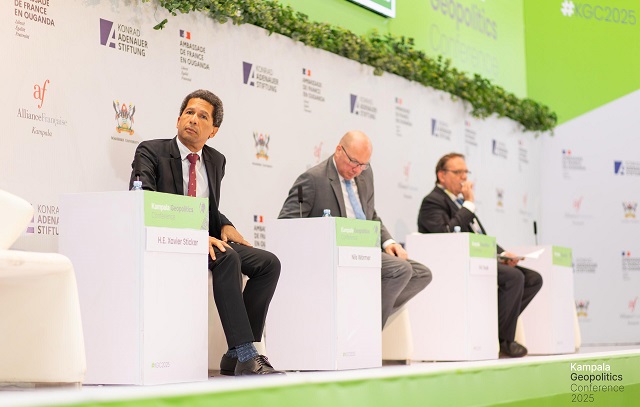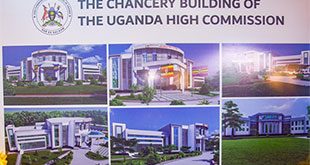
Kampala Geopolitics Conference highlights Africa’s role in AI governance and peacebuilding
KAMPALA, UGANDA | Patricia Akankwatsa | The 8th edition of the Kampala Geopolitics Conference commenced on April 9, 2025, at Makerere University, emphasizing Africa’s perspectives in international debates. The event convened scholars, policymakers, diplomats, and students to deliberate on pressing global issues through an African lens.
Representing the Vice Chancellor, Prof Helen Nambalirwa the Principal of the College of Humanities and Social Sciences at Makerere University inaugurated the conference. The professor highlighted the conference’s objective to amplify African voices in global discussions, covering topics such as peace and conflict particularly the situation in the Democratic Republic of Congo (DRC), artificial intelligence (AI), governance, and sustainable peacebuilding.
Addressing the complexities of AI, the professor highlighted the necessity for regulation at both governmental and personal levels. He referenced the recent launch of a safeguarding policy aimed at promoting responsible social media use and curbing misinformation.
“It’s truly remarkable how our researchers and students have effectively utilised AI for crucial advancements like disease detection and diagnosis, air quality management, improved healthcare access and enhanced water quality monitoring among other innovations. Many of our students have contributed to grassroots peacebuilding through various social initiatives and efforts are in progress to leverage AI and digital platforms for peace creation.”
“Nevertheless, it’s equally concerning to witness the potential for this same technology to be exploited for harmful purposes such as spreading misinformation to incite unrest and disenfranchisement”, she added.
The French Ambassador to Uganda, Xavier Sticker echoed these concerns, emphasizing the need to balance scientific advancement with human rights protection. He pointed out AI’s potential impact on political rights, especially in electoral contexts where it could be used to create misleading content.
“The international nature of AI necessitates both extensive discussion and the formulation of concrete solutions. A fundamental dilemma lies in determining the extent of its governance: should scientific and commercial advancement proceed without restriction, or do we need regulations to shield our human rights from the unseen exploitation of our data?”
“This issue extends beyond economics and human rights, impacting political rights through AI’s ability to construct alternative realities. Imagine the consequences during an election if fabricated podcasts misrepresent candidates. Regulation could be a solution, but over-regulation also presents dangers. Thus, finding the delicate equilibrium requires thorough debate and careful consideration within specific contexts”.
The conference also tackled the topic of United Nations Security Council (UNSC) reform. The French Ambassador reiterated France’s support for granting Africa two permanent seats with veto rights. He mentioned France’s initiative with Mexico to promote responsible veto use, particularly in humanitarian emergencies.
Nils Wörmer, Director of the Konrad Adenauer Stiftung’s Security Dialogue for East Africa, noted that while over 70% of UNSC resolutions concern Africa, the continent still lacks permanent representation, highlighting the need for reform.
He outlined challenges such as conflicts in the DRC and South Sudan, Uganda’s involvement in Somalia’s stabilization through AMISOM, and the upcoming 2026 presidential elections. The country’s substantial contribution to peacekeeping missions, particularly in Somalia, was also acknowledged.
“Africa has witnessed the highest number of peacekeeping operations globally in recent years.
The continent’s regional organizations, alongside the UN and the African Union, have been deeply involved, as demonstrated by the ongoing mission in Somalia. The stability of the Horn of Africa is, in our view, a critical matter, a sentiment echoed by the European Union given the substantial risk of flight and migration from a destabilized Horn beset by failing states and groups like Al-Shabaab”.
“Uganda’s vital role and extensive experience in peacekeeping, particularly its decade-plus contribution of troops to Somalia, are undeniable assets. Therefore, we are committed to integrating Ugandan perspectives. We, as Europeans, understand the complexities of stabilizing African nations and acknowledge the limited success of our past peacekeeping endeavours in other regions”.
The conference addressed the challenges faced by landlocked countries like Uganda in accessing international markets. Discussions focused on ensuring supply chain security through critical maritime routes such as the Red Sea, Gulf of Oman, and Indian Ocean.
Speakers emphasized the importance of maritime security, including piracy prevention, environmental protection, and resource management. The BBNG agreement on biodiversity protection was highlighted, with hopes expressed for Uganda’s ratification by June 2025, aligning with the anticipated ratification by 60 states.
In addition to academic discussions, the conference incorporated cultural and artistic activities related to peace, security, gender, and identity. These activities aimed to provide a holistic approach to geopolitical analysis by including lived experiences and cultural dimensions.
 The Independent Uganda: You get the Truth we Pay the Price
The Independent Uganda: You get the Truth we Pay the Price



